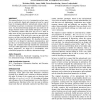Free Online Productivity Tools
i2Speak
i2Symbol
i2OCR
iTex2Img
iWeb2Print
iWeb2Shot
i2Type
iPdf2Split
iPdf2Merge
i2Bopomofo
i2Arabic
i2Style
i2Image
i2PDF
iLatex2Rtf
Sci2ools
106
click to vote
CHI
2008
ACM
2008
ACM
Interactional empowerment
We propose that an interactional perspective on how emotion is constructed, shared and experienced, may be a good basis for designing affective interactional systems that do not infringe on privacy or autonomy, but instead empowers users. An interactional design perspective may make use of design elements such as open-ended, ambiguous, yet familiar, interaction surfaces that users may use as a basis to make sense of their own emotions and their communication with one-another. With such tools, users are provided with power over their own data and the interpretation of it ? providing for privacy and autonomy. We describe the interactional view on design for emotional communication, and provide a set of orienting design concepts and methods for design and evaluation that help translate the interactional view into viable applications. From an embodied interaction theory perspective, we argue for a non-dualistic, nonreductionist perspective on affective interaction design. Author Keywords ...
Affective Interaction Design | Affective Interactional Systems | CHI 2008 | Human Computer Interaction | Interactional Design Perspective |
Related Content
| Added | 30 Nov 2009 |
| Updated | 30 Nov 2009 |
| Type | Conference |
| Year | 2008 |
| Where | CHI |
| Authors | Anna Ståhl, Jarmo Laaksolahti, Kristina Höök, Petra Sundström |
Comments (0)

